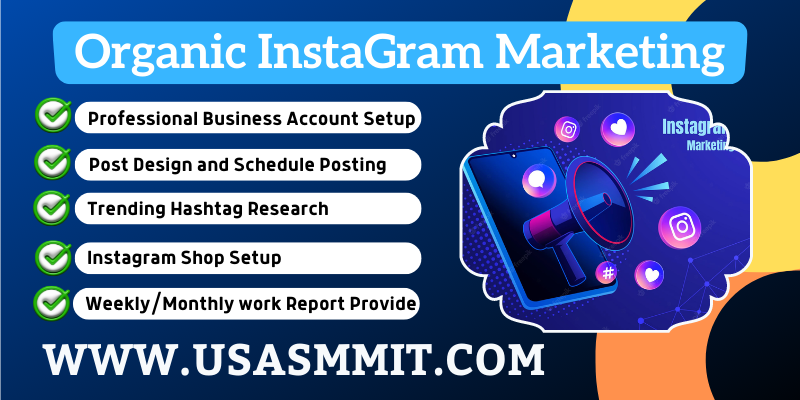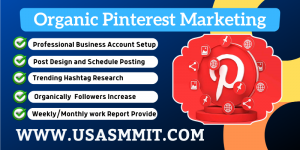Organic InstaGram Marketing
It’s about building relationships with your followers and establishing yourself as a trusted source of information. Here are some tips for organic Instagram marketing:
2. Write captions that are interesting and informative, without being too “sales-y”.
Here are some tips for organic Instagram marketing:
1. Find your niche The first step to organic Instagram marketing is finding your niche. What kind of content do you want to share? What are you passionate about? Once you know what kind of content you want to share, it will be easier to find an audience that will appreciate it.
3. Be active and engaged Another important part of organic Instagram marketing is being active and engaged with your followers. Like and comment on their posts, answer their questions, and start conversations.
The more engaged you are with your followers, the more likely they are to stick around and continue following you.
How Do You Promote Organic on Instagram?
- Use hashtags: Hashtags are a great way to increase the visibility of your content and reach new audiences. Make sure you use relevant, popular hashtags that will help people find your content.
- Engage with other users: Commenting on and liking other users’ content is a great way to get noticed and start building relationships with other users. If you can get involved in conversations and offer valuable insights, you’ll quickly build up a following.
- Post regularly: Consistency is key when it comes to promoting your content on Instagram. If you post regularly, people will start to recognize your brand and be more likely to engage with your content.
- Use Stories: Stories are a great way to connect with your audience in a more personal way
You can share behind-the-scenes footage, give sneak peeks of new products or services, or simply show what goes into running your business.
Is Organic Growth on Instagram Possible?
1) Use hashtags wisely: Hashtags are a great way to reach new audiences and get your photos seen by more people. However, using too many hashtags or irrelevant hashtags can actually hurt your chances of being found. Use a mix of popular and niche-specific hashtags, and make sure they are relevant to the photo you’re sharing.
2) Engage with other users: Take some time each day to like and comment on other users’ photos. Not only will this help get your name out there, but you’ll also start building up relationships with other users. These relationships can be beneficial down the line when you need help promoting a post or reaching out to collaborate with someone.
3) Post high-quality content: This should go without saying, but make sure the photos you’re posting are high quality and engaging! If your photos are average or boring, people won’t be motivated to follow you. Also, try to post regularly so that your followers have something new to see every time they visit your page.
4) Use Instagram Stories: Utilize all of the features Instagram has to offer by using Stories as well as regular posts. Stories are a great way to share behind-the-scenes content, sneak peeks of upcoming products or events, and just general daily life updates. You can also use story highlights to group together similar stories for easy viewing later on.
5) Be patient!: Growing an organic following takes time – don’t expect thousands of new followers overnight!
Can You Target Organic Posts on Instagram?
Yes, you can target organic posts on Instagram! Just like any other post, you can use hashtags, geotags, and @-mentions to make sure your content is seen by people who are interested in what you’re sharing. You can also use Instagram’s Insights tool to see how your organic posts are performing and who is engaging with them.
Organic Social Media Marketing Examples
One great example of organic social media marketing comes from the travel brand Lonely Planet. Their Twitter account is full of beautiful photos and interesting facts about different destinations around the world. This content is not only visually appealing but also informative, which makes it perfect for their target audience of travelers.
In addition to posting great content, Lonely Planet also interacts with their followers on a regular basis, which helps them build a strong relationship with their audience. Another excellent example of organic social media marketing comes from the fashion retailer ASOS. They use their Instagram account as a way to showcase both their products and the people who wear them.
This strategy humanizes the brand and makes potential customers feel more connected to ASOS as a result. In addition to stunning product photos, ASOS also posts behind-the-scenes shots of their team at work which further adds to the feeling that this is a relatable brand that cares about its customers. These are just two examples of successful organic social media marketing campaigns from well-known brands, but there are endless possibilities when it comes to what you can create.
The key is to produce content that aligns with your brand identity and resonates with your target audience. With a little creativity and effort, you can launch an effective organic social media marketing campaign for your business!
Organic Vs Paid Marketing
Should you focus on organic marketing or paid marketing? Let’s take a closer look at each type of marketing and see which one is more effective for businesses. What is Organic Marketing?
Organic marketing refers to any marketing efforts that are not paid for. In other words, it’s free advertising. Some common examples of organic marketing include:
• Creating informative blog posts or articles
• Creating helpful videos on YouTube or other video sharing sites While organic marketing requires some time and effort upfront, it can be very effective in the long run. That’s because once you create helpful, quality content, it will continue to drive traffic and leads long after you publish it.
Plus, if you do SEO right, your content could rank high in search engine results pages (SERPs), which means even more people will see it over time. And since organic traffic is free, it can help you save money on your overall marketing budget down the road. Done correctly, an effective organic marketing strategy can help build brand awareness and credibility, generate leads and sales, and even improve your search engine rankings – all while costing you nothing but time!
Of course , as with anything else , there are also some potential downsides to using organic marketing . First , it takes time to produce quality content . If you want immediate results , paid ads may be a better option . Second , Not every piece of content will be successful . You may have to experiment with different topics , formats , and strategies before finding something that resonates with your audience . Finally , While organic traffic is free now , that could change in the future if Google decides to start charging for it . So while there are some risks involved with investing in organic marketing , we believe the potential rewards make it worth pursuing for most businesses . Now let ’ s take a look at paid advertising … What is Paid Advertising ? As its name suggests , paid advertising involves paying money to promote your business or product .
Organic Likes Instagram
Organic Social Media Strategy Template
Our organic social media strategy template will help you create a plan that covers all the bases, from content creation to community management. You’ll be able to customize the template to fit your brand voice and goals. And, you’ll be able to track your progress along the way!
Benefits of Organic Social Media
Perhaps the most obvious benefit is that it is free. When a brand’s social media presence grows organically, they don’t have to spend any money on ads or other forms of paid promotion. In addition to being free, organic social media growth can also be more sustainable in the long run.
A brand that has a large number of organic fans and followers is likely to continue growing at a similar rate, since people are more likely to recommend products and services that they already like and trust. Paid promotions can sometimes result in a quick burst of growth, but it’s not always sustainable. Finally, organic social media growth tends to be more authentic than paid promotion.
When people see that a product or service has been recommended by someone they know and trust, they are more likely to trust the recommendation themselves. This authenticity can go a long way in building trust with potential customers. Overall, there are many benefits to organic social media growth for brands.
It’s important to note that this type of growth takes time and patience – it doesn’t happen overnight. But for brands willing to put in the work, the rewards can be great.
Paid Social Media Marketing
Organic Content Meaning
This can include blog posts, articles, infographics, videos, etc. that you produce and share on your own website or through social media channels. One of the main benefits of creating organic content is that it helps you build trust with your audience. When people see that you’re regularly sharing high-quality, valuable information for free, they’re more likely to view you as an expert in your field and be more open to doing business with you down the road.
Another advantage of organic content is that it can help improve your search engine optimization (SEO). When done right, your organic content can attract attention from Google and other search engines, which can then lead to higher rankings in search results and more traffic to your website. Of course, creating quality organic content takes time and effort – there’s no getting around that.
But if you’re willing to put in the work, it can be a highly effective way to grow your brand and business over time.
Organic Media Examples
-Social media posts (e.g., tweets, Facebook updates, Instagram photos)
-User reviews and testimonials Organic media can be an extremely effective way to reach new audiences and promote your brand or product. After all, when users see that their friends and peers are sharing something, they’re much more likely to check it out themselves.
Moreover, organic media often has a more “authentic” feel than traditional advertising, which can make it more persuasive and trustworthy. Of course, creating great organic content isn’t always easy. It takes time and effort to produce something truly shareworthy.
However, if you can put in the work, organic media can be an incredibly powerful marketing tool.
Conclusion
Here are a few tips to help you get started:
3. Engage with other users: Like and comment on other people’s posts, and follow accounts that interest you. This will not only get you more visibility, but it will also help build relationships with other users which can lead to increased engagement on your own posts.





There are no reviews yet.